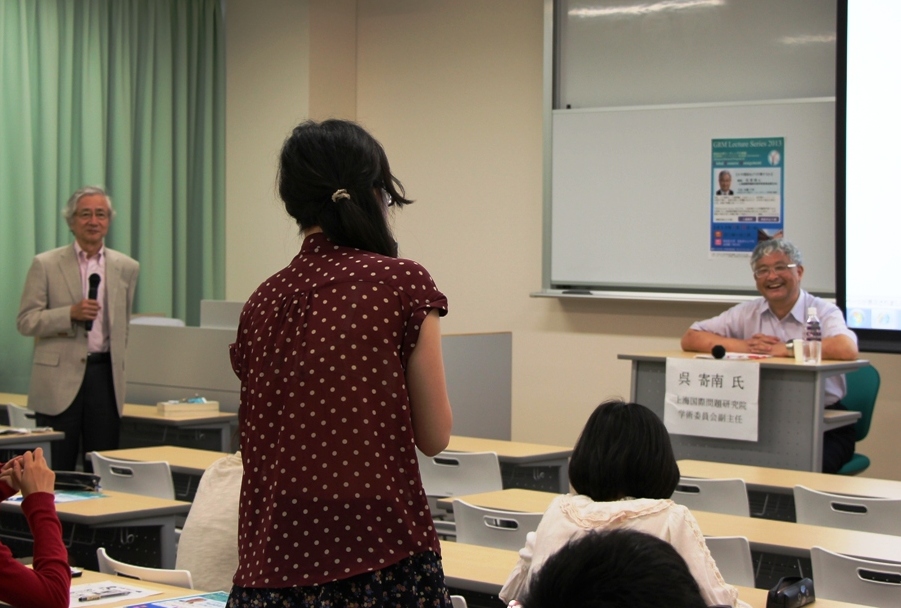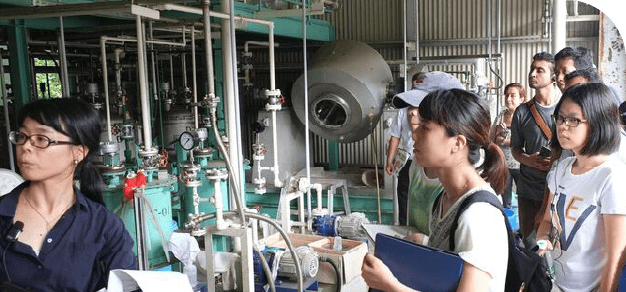GRM Students’ Reports
Improving the Japan-China relationship
Graduate School of Global Studies Takuya MORIYAMA
2013/07/11
GRM Lecture Series
Date: July 11 (Thu), 2013
Venue: IMADEGAWA (Karasuma Campus), Shikokan SK110
Theme: "Improving the Japan-China relationship"
Lecturer: Dr. Wu JiNan (Director and Senior Fellow of the Department of Japanese
Studies, Shanghai Institutes for International Studies)
*********************************************
1. Overview of the Lecture
In the lecture, China’s outstanding issues since its economic reform and breakthrough of the Japan-China relationship were presented. Chinese economic reform is still evolving, fighting with vested interests. While it is very hard to achieve, dissolving vested interests is the key for reform projects.
Today is a turning point for the conventional pattern of development and economic growth. In China, huge amounts of resources such as construction materials, fossil fuels, and mineral resources are being consumed. There is also serious environmental pollution. China’s emission of carbon dioxide is the largest in the world today. In addition, China is facing many other issues, such as economic disparity between large cities and rural areas, human rights violations of farmers who migrated from rural areas to large cities, political corruption, and an ethnic minority problem. As a superpower, more contributions to international society are also required.
Under the Xi Jinping government, deregulation and an international cooperative policy have brought good results. For its strategy to achieve more growth, construction of infrastructure such as housing, waterworks, highways, and rapid-transit railways as well as development of private sector capital and human resource development is necessary.
The territorial conflict in the Senkaku Islands is affecting the China-Japan relationship adversely. On the other hand, because of intensified economic interdependency, China and Japan need each other. Other countries, especially the United States, do not allow the deterioration of China-Japan relations. The China-Japan relationship is more than that of a married couple—they cannot divorce. A risk management system, the promotion of cultural exchange among intellectuals and civilians, and the closest economic ties are necessary to achieve a better relationship. The role of the media in providing correct information on the counterpart country is also being emphasized.
2. Outcome
China is experiencing both rapid growth and increasing social issues, such as economic disparity and environmental pollution. These contemporary issues are difficult to resolve by one country alone. Because Japan is a frontrunner in solving these contemporary issues,Japan and China can cooperate, using their experience and technology. It is important to propose a new model in the post-growth society.
China and Japan must develop a crisis prevention system for territorial conflicts. In addition, public and private interaction and efforts toward mutual understanding are necessary. The role of the media is especially important. Since news reports strongly affect national image, the media must avoid creating and propagating a negative image of the counterpart. Multifaceted viewpoints and information, including that on daily life and culture, must be shown. Mutual understanding among citizens through exchange in education, economics, and culture will be a strong base for the China-Japan relationship to develop favorably.
Detail of Lecture (Japanese)



